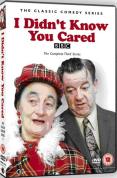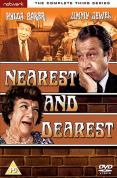 I Didn't Know You Cared - The Complete Second Series | DVD | (22/05/2006)
from £25.97
| Saving you £-5.98 (N/A%)
| RRP
I Didn't Know You Cared - The Complete Second Series | DVD | (22/05/2006)
from £25.97
| Saving you £-5.98 (N/A%)
| RRP From the books of Peter Tinniswood comes one of television's greatest comedy families The Brandons. There's miserable pessimist Uncle Mort his sharp-tongued sister Annie who is constantly arguing with husband Les their laid-back son Carter and his not so laid-back fianc Pat and finally old Uncle Stavely who carries his friend's ashes around his neck in a box and only enters the constant bickering with a cry of 'I 'eard that! Pardon?' Pat is desperately trying to turn reluctant C
![Inspector Morse - Disc 23 And 24 - The Death Of The Self / Absolute Conviction [1987]](/pictures/1022705.jpg) Inspector Morse - Disc 23 And 24 - The Death Of The Self / Absolute Conviction | DVD | (12/08/2002)
from £7.46
| Saving you £7.53 (100.94%)
| RRP
Inspector Morse - Disc 23 And 24 - The Death Of The Self / Absolute Conviction | DVD | (12/08/2002)
from £7.46
| Saving you £7.53 (100.94%)
| RRP When Inspector Morse first appeared on television in 1987, nobody could have predicted that it would run into the next century, maintaining throughout a quality of scripts and story lines that raised the genre of the detective series to a new level. Much of its success can be attributed to John Thaw's total immersion in the role. Morse is a prickly character and not obviously easy to like. As a detective in Oxford with unfulfilled academic propensities, he is permanently excluded from a world of which he would dearly love to be a part. He is at odds with that world--and with his colleagues in the police force--most of the time. Passionate about opera and "proper beer", he is a cultural snob for whom vulgarity causes almost physical pain. As a result, he lives from one disillusionment to another. And he is scarred--more deeply than he would ever admit--by past relationships. But he also has a naïve streak and, deep-down sensitivity, which makes him a fascinating challenge for women. At the heart of Morse's professional life is his awkward partnership with Detective Sergeant Lewis, the resolutely ordinary, worldly sidekick who manages to keep his boss in an almost permanent state of exasperation while retaining his grudging respect. It's a testament to Kevin Whateley's consistently excellent performance that from such unpromising material, Lewis becomes as indispensable to the series as Barrington Pheloung's hypnotic, classic theme music. Morse's investigations do occasionally take him abroad to more exotic locations, but throughout 14 successful years of often gruesome murders, the city of Oxford itself became a central character in these brooding two-hour dramas: creator Colin Dexter stating he finally had to kill Morse off because he was giving Oxford a bad reputation as a dangerous place! --Piers Ford
 I Didn't Know You Cared - Third Series | DVD | (28/08/2006)
from £8.74
| Saving you £11.25 (56.30%)
| RRP
I Didn't Know You Cared - Third Series | DVD | (28/08/2006)
from £8.74
| Saving you £11.25 (56.30%)
| RRP From the books of Peter Tinniswood comes one of television's greatest comedy families The Brandons. There's miserable pessimist Uncle Mort his sharp-tongued sister Annie who is constantly arguing with husband Les their laid-back son Carter and his not so laid-back fianc Pat and finally old Uncle Stavely who carries his friend's ashes around his neck in a box and only enters the constant bickering with a cry of ""I 'eard that! Pardon?"" Episodes comprise: 1. Men At Work 2. A Grave Decision 3. Party Games 4. A Bleak Day 5. Stout Deeds 6. Paradise Lost 7. The Last Tram
![Inspector Morse - Disc 31 And 32 - Death Is Now My Neighbour / The Wench Is Dead [1987]](/pictures/1022667.jpg) Inspector Morse - Disc 31 And 32 - Death Is Now My Neighbour / The Wench Is Dead | DVD | (30/09/2002)
from £7.32
| Saving you £7.67 (104.78%)
| RRP
Inspector Morse - Disc 31 And 32 - Death Is Now My Neighbour / The Wench Is Dead | DVD | (30/09/2002)
from £7.32
| Saving you £7.67 (104.78%)
| RRP When Inspector Morse first appeared on television in 1987, nobody could have predicted that it would run into the next century, maintaining throughout a quality of scripts and storylines that raised the genre of the detective series to a new level. Much of its success can be attributed to John Thaw's total immersion in the role. Morse is a prickly character and not obviously easy to like. As a detective in Oxford with unfulfilled academic propensities, he is permanently excluded from a world of which he would dearly love to be a part. He is at odds with that world--and with his colleagues in the police force--most of the time. Passionate about opera and "proper beer", he is a cultural snob for whom vulgarity causes almost physical pain. As a result, he lives from one disillusionment to another. And he is scarred--more deeply than he would ever admit--by past relationships. But he also has a naïve streak and, deep down, sensitivity, which makes him a fascinating challenge for women. At the heart of Morse's professional life is his awkward partnership with Detective Sergeant Lewis, the resolutely ordinary, worldly sidekick who manages to keep his boss in an almost permanent state of exasperation while retaining his grudging respect. It's a testament to Kevin Whately's consistently excellent performance that from such unpromising material, Lewis becomes as indispensable to the series as Barrington Pheloung's hypnotic, classic theme music. Morse's investigations do occasionally take him abroad to more exotic locations, but throughout 14 successful years of often gruesome murders, the city of Oxford itself became a central character in these brooding two-hour dramas: creator Colin Dexter said he finally had to kill Morse off because he was giving Oxford a bad reputation as a dangerous place! --Piers Ford
 Nearest And Dearest - Series 3 | DVD | (03/04/2006)
from £N/A
| Saving you £N/A (N/A%)
| RRP
Nearest And Dearest - Series 3 | DVD | (03/04/2006)
from £N/A
| Saving you £N/A (N/A%)
| RRP Comedy greats Jimmy Jewel and Hilda Baker star as Eli Pledge and his sister Nellie in the classic award-winning comedy Nearest and Dearest. Eli - an aging lothario - and Nellie - virtuous to the last but in possession of a wonderfully flexible grip on the English language - inherit clapped out condiment company Pledge's Purer Pickles from their father. Much hilarity ensues amongst the malaproprisms bolshie workforce and none-too-subtle double entendres as the siblin
![Museum of Life [DVD]](/pictures/1100272.jpg) Museum of Life | DVD | (03/05/2010)
from £13.70
| Saving you £11.29 (82.41%)
| RRP
Museum of Life | DVD | (03/05/2010)
from £13.70
| Saving you £11.29 (82.41%)
| RRP The Natural History Museum attracts nearly 4 million visitors every year has 8 000 visiting scientists 70 million specimens 350 resident experts and contains examples of 90% of the world's known natural diversity. It has a world wide reputation that is genuinely second to none. By securing unrivalled access to the Natural History Museum this fascinating 6-part series follows the world class scientists their work and their stories. The National History Museum's work defines everything around us from fleas to forests precious rock formations to dinosaurs. It is an institution literally buzzing with life - whether it's field trips to Costa Rica sky diving for butterflies prepping submersibles in Loch Ness working with NASA to analyse comet dust or trying to find the cure for malaria - the Natural History Museum is at the thick of it. Helping to catalogue and conserve the extraordinary richness of life with groundbreaking projects in 68 countries . This series embraces all of the extraordinary work of the Natural History Museum - both front of house behind the scenes and out in the field.
 Deadly Manor | DVD | (04/03/2008)
from £N/A
| Saving you £N/A (N/A%)
| RRP
Deadly Manor | DVD | (04/03/2008)
from £N/A
| Saving you £N/A (N/A%)
| RRP The classic horror story follows a cast of attractive youngsters on a camping trip to a remote wooded area. Joined by a mysterious hitchhiker the group take shelter from a storm in an aging mansion. Mystery piles upon mystery.... until the deaths begin.
![Inspector Morse - Disc 1 And 2 - The Dead Of Jericho / The Silent World Of Nicholas Quinn [1987]](/pictures/1022778.jpg) Inspector Morse - Disc 1 And 2 - The Dead Of Jericho / The Silent World Of Nicholas Quinn | DVD | (20/05/2002)
from £5.98
| Saving you £9.01 (150.67%)
| RRP
Inspector Morse - Disc 1 And 2 - The Dead Of Jericho / The Silent World Of Nicholas Quinn | DVD | (20/05/2002)
from £5.98
| Saving you £9.01 (150.67%)
| RRP Two episodes from the popular TV detective series. The Dead Of Jericho Morse who never quite finds romance thinks that at last things will turn out differently when he meets beautiful Anne Stavely. But it is a love destined not to be when Anne is found hanging from a beam in mysterious circumstances. Morse suspects murder and sets out to discover the truth. Joining him is Sergeant Lewis and their investigation into 'The Dead Of Jericho' is the beginning of a lasting partn
![Big Gay Musical [DVD]](/pictures/1100352.jpg) Big Gay Musical | DVD | (26/04/2010)
from £11.97
| Saving you £3.02 (25.23%)
| RRP
Big Gay Musical | DVD | (26/04/2010)
from £11.97
| Saving you £3.02 (25.23%)
| RRP Starring in the Off-Broadway musical comedy Adam & Steve - Just the way God made 'em aspiring actors Paul and Eddie find their complicated lives mirroring their onstage characters. Through rousing musical numbers that feature scantily clad tap-dancing angels a clever retelling of Genesis creepy televangelists and a camp that attempts to turn gay kids straight everyone realizes that life gets better once they accept who they really are: Just the way God made 'em!
![The Battle [Blu-ray]](/pictures/1126257.jpg) The Battle | Blu Ray | (05/05/2014)
from £26.98
| Saving you £-6.99 (N/A%)
| RRP
The Battle | Blu Ray | (05/05/2014)
from £26.98
| Saving you £-6.99 (N/A%)
| RRP The Battle chronicles the story of Mexico's Battle of Puebla, the most important battle in Mexico's history. When the unbeatable French army invades Mexico to set up a monarchy, General Ignacio Zaragoza played by Kuno Becker (Goal, From Prada to Nada), must defend the city of Puebla, commanding a poorly armed and outnumbered troop of men. Meanwhile, two young Mexican lovers manage to find loveamidst the chaos of war. Cinco de Mayo, The Battle chronicles the bravery of a people pushed.
![We Think The World Of You [DVD] [1989]](/pictures/1107189.jpg) We Think The World Of You | DVD | (04/04/2011)
from £N/A
| Saving you £N/A (N/A%)
| RRP
We Think The World Of You | DVD | (04/04/2011)
from £N/A
| Saving you £N/A (N/A%)
| RRP Frank's lover Johnny gets sent to prison. Offering to help out Frank begins to visit Johnny's mum and soon sees that his beautiful dog Evie is being neglected. Frank's longing for Johnny mutates into love for the dog. He cares with increasing desperation. His war of nerves with Johnny's wife intensifies. He can give poor Evie a good life! Can't Johnny see that? Can't his family see that? Hilarious yet touching the film carefully preserves the stifling discretion of the era.
![Inspector Morse - Disc 17 And 18 - Fat Chance / Who Killed Harry Field [1987]](/pictures/1022730.jpg) Inspector Morse - Disc 17 And 18 - Fat Chance / Who Killed Harry Field | DVD | (15/07/2002)
from £10.93
| Saving you £4.06 (37.15%)
| RRP
Inspector Morse - Disc 17 And 18 - Fat Chance / Who Killed Harry Field | DVD | (15/07/2002)
from £10.93
| Saving you £4.06 (37.15%)
| RRP When Inspector Morse first appeared on television in 1987, nobody could have predicted that it would run into the next century, maintaining throughout a quality of scripts and story lines that raised the genre of the detective series to a new level. Much of its success can be attributed to John Thaw's total immersion in the role. Morse is a prickly character and not obviously easy to like. As a detective in Oxford with unfulfilled academic propensities, he is permanently excluded from a world of which he would dearly love to be a part. He is at odds with that world--and with his colleagues in the police force--most of the time. Passionate about opera and "proper beer", he is a cultural snob for whom vulgarity causes almost physical pain. As a result, he lives from one disillusionment to another. And he is scarred--more deeply than he would ever admit--by past relationships. But he also has a naïve streak and, deep-down sensitivity, which makes him a fascinating challenge for women. At the heart of Morse's professional life is his awkward partnership with Detective Sergeant Lewis, the resolutely ordinary, worldly sidekick who manages to keep his boss in an almost permanent state of exasperation while retaining his grudging respect. It's a testament to Kevin Whateley's consistently excellent performance that from such unpromising material, Lewis becomes as indispensable to the series as Barrington Pheloung's hypnotic, classic theme music. Morse's investigations do occasionally take him abroad to more exotic locations, but throughout 14 successful years of often gruesome murders, the city of Oxford itself became a central character in these brooding two-hour dramas: creator Colin Dexter stating he finally had to kill Morse off because he was giving Oxford a bad reputation as a dangerous place! --Piers Ford
![Inspector Morse - Disc 25 And 26 - Cherubim And Seraphim / Deadly Slumber [1987]](/pictures/1022686.jpg) Inspector Morse - Disc 25 And 26 - Cherubim And Seraphim / Deadly Slumber | DVD | (09/09/2002)
from £5.98
| Saving you £9.01 (150.67%)
| RRP
Inspector Morse - Disc 25 And 26 - Cherubim And Seraphim / Deadly Slumber | DVD | (09/09/2002)
from £5.98
| Saving you £9.01 (150.67%)
| RRP When Inspector Morse first appeared on television in 1987, nobody could have predicted that it would run into the next century, maintaining throughout a quality of scripts and storylines that raised the genre of the detective series to a new level. Much of its success can be attributed to John Thaw's total immersion in the role. Morse is a prickly character and not obviously easy to like. As a detective in Oxford with unfulfilled academic propensities, he is permanently excluded from a world of which he would dearly love to be a part. He is at odds with that world--and with his colleagues in the police force--most of the time. Passionate about opera and "proper beer", he is a cultural snob for whom vulgarity causes almost physical pain. As a result, he lives from one disillusionment to another. And he is scarred--more deeply than he would ever admit--by past relationships. But he also has a naïve streak and, deep down, sensitivity, which makes him a fascinating challenge for women. At the heart of Morse's professional life is his awkward partnership with Detective Sergeant Lewis, the resolutely ordinary, worldly sidekick who manages to keep his boss in an almost permanent state of exasperation while retaining his grudging respect. It's a testament to Kevin Whately's consistently excellent performance that from such unpromising material, Lewis becomes as indispensable to the series as Barrington Pheloung's hypnotic, classic theme music. Morse's investigations do occasionally take him abroad to more exotic locations, but throughout 14 successful years of often gruesome murders, the city of Oxford itself became a central character in these brooding two-hour dramas: creator Colin Dexter said he finally had to kill Morse off because he was giving Oxford a bad reputation as a dangerous place! --Piers Ford
 2 Point 4 Children - Series 3 | DVD | (22/08/2005)
from £N/A
| Saving you £N/A (N/A%)
| RRP
2 Point 4 Children - Series 3 | DVD | (22/08/2005)
from £N/A
| Saving you £N/A (N/A%)
| RRP Statistically the Porters may just be an ordinary family. But there's nothing average about this razor-sharp comedy an endearingly demented portrait of modern family life by Andrew Marshall writer of the Emmy-winning Alexei Sayle's Stuff. Head of the household is Ben a dedicated central-heating engineer and easy-going husband and father. His idea of helping in the house is to change TV channels provided the remote control is within easy reach. Mainstay of the household is Bill a
![Inspector Morse - Disc 9 And 10 - The Last Enemy / Deceived By The Flight [1987]](/pictures/1022746.jpg) Inspector Morse - Disc 9 And 10 - The Last Enemy / Deceived By The Flight | DVD | (24/06/2002)
from £8.19
| Saving you £6.80 (83.03%)
| RRP
Inspector Morse - Disc 9 And 10 - The Last Enemy / Deceived By The Flight | DVD | (24/06/2002)
from £8.19
| Saving you £6.80 (83.03%)
| RRP When Inspector Morse first appeared on television in 1987, nobody could have predicted that it would run into the next century, maintaining throughout a quality of scripts and story lines that raised the genre of the detective series to a new level. Much of its success can be attributed to John Thaw's total immersion in the role. Morse is a prickly character and not obviously easy to like. As a detective in Oxford with unfulfilled academic propensities, he is permanently excluded from a world of which he would dearly love to be a part. He is at odds with that world--and with his colleagues in the police force--most of the time. Passionate about opera and "proper beer", he is a cultural snob for whom vulgarity causes almost physical pain. As a result, he lives from one disillusionment to another. And he is scarred--more deeply than he would ever admit--by past relationships. But he also has a naïve streak and, deep-down sensitivity, which makes him a fascinating challenge for women. At the heart of Morse's professional life is his awkward partnership with Detective Sergeant Lewis, the resolutely ordinary, worldly sidekick who manages to keep his boss in an almost permanent state of exasperation while retaining his grudging respect. It's a testament to Kevin Whateley's consistently excellent performance that from such unpromising material, Lewis becomes as indispensable to the series as Barrington Pheloung's hypnotic, classic theme music. Morse's investigations do occasionally take him abroad to more exotic locations, but throughout 14 successful years of often gruesome murders, the city of Oxford itself became a central character in these brooding two-hour dramas: creator Colin Dexter stating he finally had to kill Morse off because he was giving Oxford a bad reputation as a dangerous place! --Piers Ford
![Inspector Morse - Disc 27 And 28 - Day Of The Devil / Twilight Of The Gods [1987]](/pictures/1022688.jpg) Inspector Morse - Disc 27 And 28 - Day Of The Devil / Twilight Of The Gods | DVD | (09/09/2002)
from £11.60
| Saving you £4.65 (44.97%)
| RRP
Inspector Morse - Disc 27 And 28 - Day Of The Devil / Twilight Of The Gods | DVD | (09/09/2002)
from £11.60
| Saving you £4.65 (44.97%)
| RRP When Inspector Morse first appeared on television in 1987, nobody could have predicted that it would run into the next century, maintaining throughout a quality of scripts and storylines that raised the genre of the detective series to a new level. Much of its success can be attributed to John Thaw's total immersion in the role. Morse is a prickly character and not obviously easy to like. As a detective in Oxford with unfulfilled academic propensities, he is permanently excluded from a world of which he would dearly love to be a part. He is at odds with that world--and with his colleagues in the police force--most of the time. Passionate about opera and "proper beer", he is a cultural snob for whom vulgarity causes almost physical pain. As a result, he lives from one disillusionment to another. And he is scarred--more deeply than he would ever admit--by past relationships. But he also has a naïve streak and, deep down, sensitivity, which makes him a fascinating challenge for women. At the heart of Morse's professional life is his awkward partnership with Detective Sergeant Lewis, the resolutely ordinary, worldly sidekick who manages to keep his boss in an almost permanent state of exasperation while retaining his grudging respect. It's a testament to Kevin Whately's consistently excellent performance that from such unpromising material, Lewis becomes as indispensable to the series as Barrington Pheloung's hypnotic, classic theme music. Morse's investigations do occasionally take him abroad to more exotic locations, but throughout 14 successful years of often gruesome murders, the city of Oxford itself became a central character in these brooding two-hour dramas: creator Colin Dexter said he finally had to kill Morse off because he was giving Oxford a bad reputation as a dangerous place! --Piers Ford
![Bang Goes the Theory - BBC Series 1 & 2 [DVD]](/pictures/1110909.jpg) Bang Goes the Theory - BBC Series 1 & 2 | DVD | (12/09/2011)
from £7.38
| Saving you £12.61 (170.87%)
| RRP
Bang Goes the Theory - BBC Series 1 & 2 | DVD | (12/09/2011)
from £7.38
| Saving you £12.61 (170.87%)
| RRP A guide to popular science. Discover the scientific principles that shape our world.An irreverent and fun magazine-style series looking at how science shapes the world around us. A team of experts grapple with hands-on experiments; relating to everything from amateur space travel to artificial life. From exploring the world's most advanced technological breakthroughs to learning how we can test and manipulate science in our own backyard, this series will put scientific theory to the test.Flight engineer Jem, biochemist Liz, science-mad Dallas and roving reporter Dr Yan take part in big stunts and team challenges, and get a glimpse of the technology of the future. With a PhD, a collection of science degrees and an enduringpassion for all things scientific, the four presenters are the perfect group to bring cutting edge science to your screen.
![In Loving Memory - Series 2 [DVD] [1980]](/pictures/1094821.jpg) In Loving Memory - Series 2 | DVD | (06/07/2009)
from £8.35
| Saving you £4.64 (55.57%)
| RRP
In Loving Memory - Series 2 | DVD | (06/07/2009)
from £8.35
| Saving you £4.64 (55.57%)
| RRP In Loving Memory: Series 2
![The Other Side Of Underneath [DVD]](/pictures/1094146.jpg) The Other Side Of Underneath | DVD | (13/07/2009)
from £12.99
| Saving you £7.00 (53.89%)
| RRP
The Other Side Of Underneath | DVD | (13/07/2009)
from £12.99
| Saving you £7.00 (53.89%)
| RRP Arden's violent and powerful adaptation of her work with The Holocaust women's theatre troupe looks into the mind of a woman labelled schizophrenic - and finds not madness but tortured sexual guilt created by the taboos of society
![Saving Sloane [DVD] [2021]](/pictures/1158531.jpg) Saving Sloane | DVD | (28/03/2022)
from £4.90
| Saving you £N/A (N/A%)
| RRP
Saving Sloane | DVD | (28/03/2022)
from £4.90
| Saving you £N/A (N/A%)
| RRP After spoiled city girl Sloane Emerson gets in trouble yet again, her wealthy parents send her off to the country. There, the rebellious teen ends up forming a bond with the last thing in the world she would've thought - a horse.

Please wait. Loading...
This site uses cookies.
More details in our privacy policy